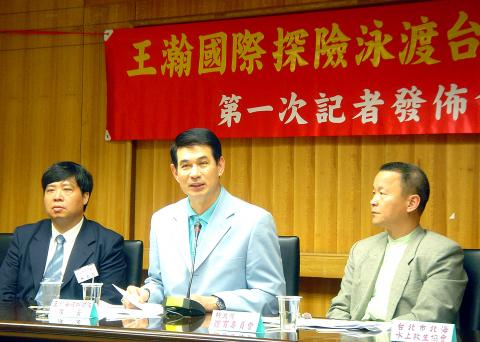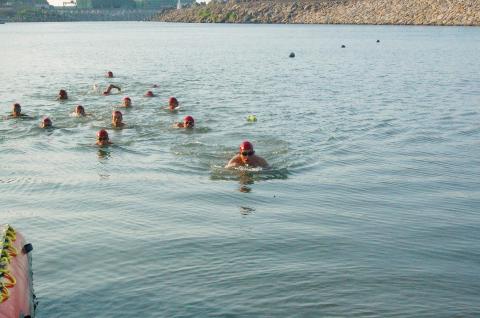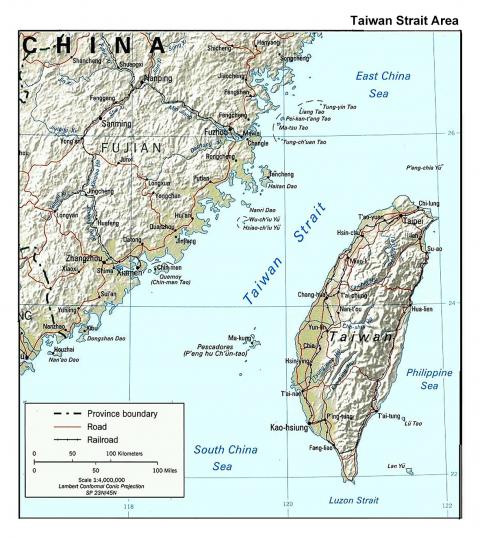Aug. 19 to Aug. 25
After swimming for 8.5 hours and subsisting on just bread and ginger soup, an exhausted Wang Han (王瀚) reached the shores of Morocco.
The former actor’s feat made the headlines on Aug. 24, 1986, with the United Daily News (聯合報) calling it a “risky journey across the demonic strait.”

Photo: CNA
Some praised him as the “first Chinese person to swim across the Strait of Gibraltar,” while others noted that he was the “first in the East.” This was a time when everyone in Taiwan was still taught to identify as Chinese, and Wang claimed that he did it for the “spirit of the Chinese people.”
Wang would end up traversing, whether alone or in a relay team, 11 more major world straits over the following 12 years. However, there was one challenge left, one that was closest to home: The Taiwan Strait, which was off-limits for political reasons.
ACROSS THE DEMON STRAIT

Photo: Yang Pei-hua, Taipei TImes
While most reports note the Strait of Gibraltar exploit as the beginning of Wang’s legendary run, he made his maiden long-distance voyage here in Taiwan in late 1985. A January 1986 report in Television Weekly (電視週刊) details his swim from Pingtung’s Donggang Township (東港) to Siaoliouciou island (小琉球).
This attempt was sponsored by the actor’s guild Wang belonged to, and was meant to “demonstrate the resilient and adventurous spirit of the Chinese people and to boost the image of entertainers and performers.”
Wang was never formally trained as a swimmer. Born in 1954 in rural Hsinchu, he honed his aquatic skills in the Toucian River (頭前溪) before he became acquainted with the ocean during college. At the age of 31, he walked away from acting and modeling to focus on swimming.

Photo courtesy of Wikimedia Commons
After making it to Siaoliouciou in just over six hours, Wang told the press that he would tackle the English Channel next. It isn’t clear why he ended up crossing the Strait of Gibraltar first, but there he was on the shores of Tarifa, Spain on Aug. 22, 1986. He warmed up for about an hour, and plunged in.
Despite his leg cramping up just an hour into the ordeal and strong currents pushing against him, Wang made it. The water was quite cold; fortunately the supply boat was stocked with ginger tea that kept him warm. He collapsed on the beach for a moment before pushing himself up to greet the crowd running toward him.
During the ensuing celebration, the Spanish host noted that only three people had completed the feat in modern history before Wang: two Europeans and a South Asian, making him the first East Asian to make the list.
“What’s inspiring is that Wang is not a professionally-trained swimmer,” the Minsheng Daily (民生報) reported. “Experts have criticized his form as less than ideal, and there are many people who have better stamina and skills,” it stated before praising his determination and perseverance that “embodied the spirit of the Chinese race.”
ULTIMATE GOAL
Huang swam the English Channel next in 1988, followed by the Bosphorus in 1989 and a channel around Maui, Hawaii in 1990, consistently completing one challenge per year until 1998. Three of these were solo trips while nine were done with a relay team. News footage of his team crossing the US-Canadian Strait of Juan de Fuca in 1993 and Australia’s Cleveland Bay in 1996 can be found on YouTube. Due to the prevalence of sharks in the Australian waters, the team had to swim in shark-proof cages, a first for Wang.
Wang told the press after crossing the Tsugaru Strait in 1994 that it was his eighth conquest and that he had four more to go, the final one being the Taiwan Strait. However, his 12th journey was across the Strait of Sicily in 1998; he presumably could not cross the Taiwan Strait due to tense relations between Taiwan and China, especially with the Third Taiwan Strait Crisis breaking out just two years before.
It wasn’t until 2007 that Wang announced plans to realize his dream, recruiting 24 young athletes who would each swim one hour at a time. He lamented that during all this time, the closest strait to home was also the farthest, and it wouldn’t have been possible without connections through famed Olympian sprinter Chi Cheng (紀政).
“I’m accustomed to spending my days in the ocean,” he told TVBS. “Although I haven’t challenged any strait in the past 10 years, I have been preparing this whole time to cross the Taiwan Strait.”
But the currents were unforgiving, and the team had advanced just 23km in 24 hours, while getting swept back 2km in the last hour. Coupled with the supply boat running low on fuel, the swimmers aborted the mission.
Vowing to give it another shot, Wang started recruiting people again in January 2008, but curiously there are no news items about the results — indicating that he either never made the trip or failed again.
Taiwan in Time, a column about Taiwan’s history that is published every Sunday, spotlights important or interesting events around the nation that have anniversaries this week.

Dissident artist Ai Weiwei’s (艾未未) famous return to the People’s Republic of China (PRC) has been overshadowed by the astonishing news of the latest arrests of senior military figures for “corruption,” but it is an interesting piece of news in its own right, though more for what Ai does not understand than for what he does. Ai simply lacks the reflective understanding that the loneliness and isolation he imagines are “European” are simply the joys of life as an expat. That goes both ways: “I love Taiwan!” say many still wet-behind-the-ears expats here, not realizing what they love is being an

Google unveiled an artificial intelligence tool Wednesday that its scientists said would help unravel the mysteries of the human genome — and could one day lead to new treatments for diseases. The deep learning model AlphaGenome was hailed by outside researchers as a “breakthrough” that would let scientists study and even simulate the roots of difficult-to-treat genetic diseases. While the first complete map of the human genome in 2003 “gave us the book of life, reading it remained a challenge,” Pushmeet Kohli, vice president of research at Google DeepMind, told journalists. “We have the text,” he said, which is a sequence of

Every now and then, even hardcore hikers like to sleep in, leave the heavy gear at home and just enjoy a relaxed half-day stroll in the mountains: no cold, no steep uphills, no pressure to walk a certain distance in a day. In the winter, the mild climate and lower elevations of the forests in Taiwan’s far south offer a number of easy escapes like this. A prime example is the river above Mudan Reservoir (牡丹水庫): with shallow water, gentle current, abundant wildlife and a complete lack of tourists, this walk is accessible to nearly everyone but still feels quite remote.

It’s a bold filmmaking choice to have a countdown clock on the screen for most of your movie. In the best-case scenario for a movie like Mercy, in which a Los Angeles detective has to prove his innocence to an artificial intelligence judge within said time limit, it heightens the tension. Who hasn’t gotten sweaty palms in, say, a Mission: Impossible movie when the bomb is ticking down and Tom Cruise still hasn’t cleared the building? Why not just extend it for the duration? Perhaps in a better movie it might have worked. Sadly in Mercy, it’s an ever-present reminder of just